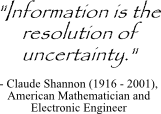Making effective decisions in high uncertainty
 Headlines over the last couple years have created a heightened feeling of uncertainty and expectation with respect to perceived global risks. Some of the top risks garnering a lot of attention include:
Headlines over the last couple years have created a heightened feeling of uncertainty and expectation with respect to perceived global risks. Some of the top risks garnering a lot of attention include:
- Global recession
- Loss of liquidity leading to a credit crisis
- Regulatory risk attributed to a changing policy environment
- Major country/economy failure
- Natural disasters/catastrophic weather
- Financial market instability
- Terrorist acts
- Accelerating technological change
- Aging population trends in developed economies
An increasing sense of uncertainty reflects a changing environment that will impact the choices we make. Recognizing and accommodating these changes provides the opportunity to increase decision making effectiveness.
Reality: Decision making always involves uncertainty
Even the simplest decisions carry some level of uncertainty. In choosing a cup of coffee, there will be at least the possibility that the coffee doesn't taste good, is not hot, or will not provide the usual pleasurable feeling. Complete certainty would imply carrying out a fixed procedure or algorithm, not making a choice.
 So, how does decision making impact uncertainty? Decision making can be described as the process of reducing uncertainty about solution options by gaining sufficient knowledge of the options to allow a reasonable selection from among them. Uncertainty is reduced, but never eliminated. If that were possible, we would be able to predict the future without error.
So, how does decision making impact uncertainty? Decision making can be described as the process of reducing uncertainty about solution options by gaining sufficient knowledge of the options to allow a reasonable selection from among them. Uncertainty is reduced, but never eliminated. If that were possible, we would be able to predict the future without error.
Seldom are decisions made with absolute certainty because complete knowledge of the alternatives is not possible or practical. There is also a distinction in levels of uncertainty. In "precise uncertainty" probabilities for solution outcomes can be known or gathered, such as in games of chance. Other risks, such as some of those suggested in the bullet list above, will often have probabilities that are not knowable.
Why does it seem like uncertainty is increasing?
Events globally and locally, along with a high level of media attention, are revealing some of the risks and uncertainty that underlie decisions that impact our perception of security. In reality, there is no permanent security in this world. Choosing not to take risks does not secure one from changes that can take place in the environment, economy, technology, society, or government.
Obvious emotions of fear and anxiety arise whenever we are separated from things that make us feel secure. People experience these emotions, particularly separation anxiety, when they move away from homes and loved ones at many stages during life. It should be expected, and acknowledged, that we will have fear of failure, loss, or rejection when we take on risk or uncertainty. Losing a sense of control over your life can be unsettling.
How should we change our decision making when uncertainty increases?
Recognizing that uncertainty brings some level of separation anxiety can help reveal some ideas for managing decision making in uncertainty. Here are some ideas to consider for times of high decision uncertainty.
- Reduce the time horizon for decisions. Build a bridge to the future by taking smaller steps, keeping something familiar and secure with each step.
- Learn as much as possible about options before choosing. Knowledge makes the new seem more familiar, reducing separation anxiety.
- Avoid unneeded risk. When the environment is providing lots of uncertainty, defer risks that are in your control. For example, when there is economic uncertainty, postpone taking on debt for buying a new car.
 Take one risk at a time when feasible. Combining risks from multiple decisions (e.g., choosing to get married and change jobs at the same time) can create confusion, increase stress, and make it difficult to learn from unsuccessful outcomes.
Take one risk at a time when feasible. Combining risks from multiple decisions (e.g., choosing to get married and change jobs at the same time) can create confusion, increase stress, and make it difficult to learn from unsuccessful outcomes.- Determine the worst case scenario. Fear of loss is higher when it is unbounded. Knowing the worst is survivable can ease this fear.
- Clarify the uncertainty. Estimate the negative and positive consequences of the risk or uncertainty. Knowledge of the potential gains and losses can encourage taking risks for good opportunities.
- Know your goals and values. The underlying premise of effective decision making is that the decision maker knows their needs and desires. Risk becomes unbounded when this is not the case.
- Invest in keeping options open. Having a wide range of options increases flexibility to accommodate an uncertain future. Options can be reduced as knowledge is obtained.
- Avoid emotional risk taking. Take risks for the right reasons based on clear, calm, and rational thought.
- Manage decisions adaptively. Increase monitoring and appraisal for decision making in uncertainty. Readily adapt as new knowledge is uncovered.
The recurring theme for uncertain times is gaining knowledge. Knowledge provides the basis for security and familiarity. Decisions provide the framework for gaining the knowledge that will reduce uncertainty and enable change.
Feeling anxious? It's probably time to make some decisions.
Return from Decision Making in Uncertainty to Decision Making Articles

